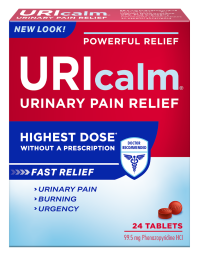Learn More About Urinary Tract Health
Urinary tract infections (UTIs) are among the most common infections, especially in women. They typically occur when bacteria, most often Escherichia coli (E. coli), which naturally lives in the digestive system, enters the urethra and multiplies in the bladder. E. coli uses tiny finger-like projections called fimbriae to cling to bladder walls, and in some cases, the bacteria can travel further into the urinary system, potentially reaching the kidneys.
Your body usually defends against these invaders, but sometimes those defenses can fail. The most common UTIs affect the bladder and urethra:
- Bladder infections (cystitis) are usually caused by E. coli. Sexual intercourse can also sometimes lead to cystitis, but you don't have to be sexually active to develop a UTI. It can happen to anyone.
- Infections of the urethra (urethritis) are a type of UTI that can happen when bacteria from the gastrointestinal tract find their way into the urethra. For women, it's important to be aware that the female urethra is located close to the vagina. As a result, sexually transmitted infections like herpes, gonorrhea, and chlamydia can also lead to urethritis.
When UTIs strike, URIcalm® offers a multi-solution approach to help you feel better and stay healthy.
Immediate Relief
URIcalm Urinary Pain Relief tablets deliver fast, targeted relief with phenazopyridine hydrochloride, the number one doctor and pharmacist-recommended ingredient for UTI pain. This clinically proven compound directly targets the source of discomfort, easing pain, burning, and urgency quickly. URIcalm also includes cranberry, widely used to support urinary tract health.
On-the-Go Comfort
The URIcalm Personal Heat Patch provides up to 12 hours of drug-free, therapeutic warmth to relax pelvic muscles and ease urinary tract discomfort. These ultra-thin, odorless patches adhere to your undergarments (not your skin) and are discreet under clothing, offering convenient relief wherever you go.
Daily Defense
Support your long-term urinary tract health with URIcalm Cranberry chewable tablets. Each berry-flavored chewable contains a blend of cranberry and D-mannose, which helps prevent harmful bacteria from sticking to urinary tract walls. Just two chewables a day help maintain a healthy urinary tract without the tart taste of cranberry juice.*
*These statements have not been evaluated by the Food and Drug Administration. This product is not intended to diagnose, treat, cure, or prevent any disease.
Powered by Froala Editor









